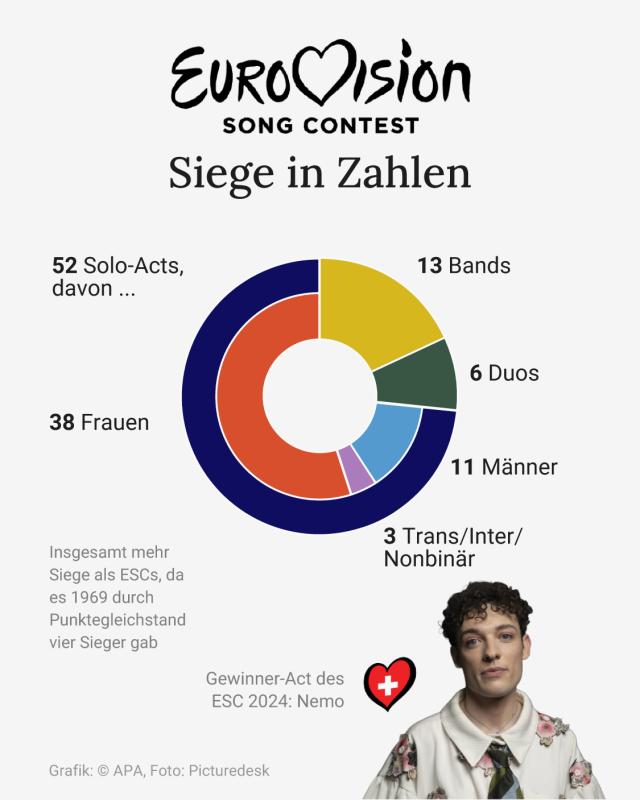Who Will Win the Eurovision Song Contest 2025 According to Statistics?
The victory of Nemo with "The Code" at the Eurovision Song Contest last year actually contradicted the long-standing statistics of the ESC. Because at least from a statistical point of view, there are relatively clear success factors that have emerged in the previous 68 editions of the competition. This includes, among other things, gender.
Women actually have the edge at the Eurovision Song Contest
A look into the ESC history shows that the statistical success rule is to compete as a solo female artist: Women form the clear majority with 38 victories among the total of 71 winners (in 1969 there were four of them). In contrast, the number of band/duo victories at the ESC seems almost modest with 19, while only eleven times a man ended up with the winner's smile on his face - with Johnny Logan for Ireland even twice the same. And the gentlemen really don't make much ground, as in the past fourteen contests only three men managed to take the trophy home: Mans Zelmerlöw from Sweden (2015), Salvador Sobral from Portugal (2017), and most recently Duncan Laurence from the Netherlands (2019). The number three also applies to the acts from the broad field of trans artists or non-binary people: Dana International (1998), Conchita Wurst (2014), and most recently Nemo (2024).

Eurovision Song Contest: Men are favorites this year
In this respect, it may be surprising that in this year's field, solo men with 14 candidates represent the largest group, narrowly beating the women with 13 participants. Interestingly, the semifinals are almost as gender-segregated as the public restrooms in the White House: Of the 15 entries in the 1st semifinal, only Justyna Steczkowska from Poland belongs to the women's faction. In the 2nd semifinal, Austria's hope JJ, with his countertenor, faces nine solo female competitors. Seven of the 37 countries rely on a band, three on duos. And while last year, with Nemo from Switzerland and Bambie Thug from Ireland, two non-binary people were chosen as acts, this field remains unplowed this year.
Ultimately, anything is possible at the Eurovision Song Contest
What is the conclusion? Despite all statistical probability, the unpredictability of the winning formula remains, which keeps the competition exciting: In 2024, a non-binary person, Nemo, won, in 2023 a woman (Loreen), in 2022 and 2021 a band (Kalush Orchestra and Måneskin), in 2019 a man (Duncan Laurence), in 2018 a woman (Netta), in 2017 a man (Salvador Sobral), in 2016 a woman (Jamala), in 2015 a man (Mans Zelmerlöw), and in 2014 Conchita. It hardly gets more diverse.
(APA/Red)
This article has been automatically translated, read the original article here.
Du hast einen Hinweis für uns? Oder einen Insider-Tipp, was bei dir in der Gegend gerade passiert? Dann melde dich bei uns, damit wir darüber berichten können.
Wir gehen allen Hinweisen nach, die wir erhalten. Und damit wir schon einen Vorgeschmack und einen guten Überblick bekommen, freuen wir uns über Fotos, Videos oder Texte. Einfach das Formular unten ausfüllen und schon landet dein Tipp bei uns in der Redaktion.
Alternativ kannst du uns direkt über WhatsApp kontaktieren: Zum WhatsApp Chat
Herzlichen Dank für deine Zusendung.



